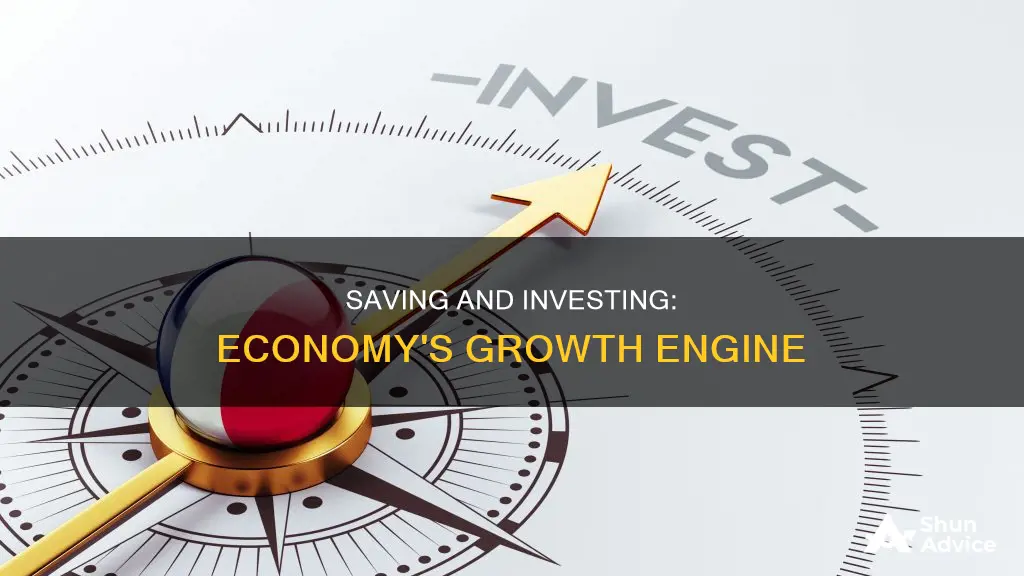
Saving and investing are important for the overall health of an economy. While the stock market is not the economy, it is a good indicator of how the economy is doing. When people invest in the stock market, they are contributing to the success of the businesses they are investing in and the economy at large. Stocks allow small investors to own part of a successful company and help savers beat inflation. They also help businesses fund growth and expansion. Similarly, savings are crucial for an individual's financial well-being and can also help speed up a country's economic recovery. Savings also help finance higher levels of investment and boost productivity in the long term.
What You'll Learn

Savings allow banks to lend more to firms for investment
In a simple economic model, the level of saving is assumed to be equal to the level of investment. This is because investment requires available capital, which is often provided by savings. For example, an entrepreneur who wants to start a new manufacturing company will likely need to borrow money to purchase or build factories and machines. This is known as the business capital structure.
The interest rate plays a crucial role in coordinating the supply and demand for loanable funds. When interest rates are high, the cost of borrowing is higher, leading people to spend less. On the other hand, when interest rates are low, borrowing becomes more affordable, increasing spending. Central banks, such as the Federal Reserve, manipulate interest rates to influence monetary policy and control economic growth.
Additionally, savings can stimulate investment, production, and employment, leading to greater sustainable economic growth. This is especially important for developing countries, as it reduces their dependence on foreign direct investment and volatile foreign financing. By increasing domestic savings, countries can boost investment in domestic financial capital, which contributes to long-term economic growth.
Furthermore, higher savings rates can speed up a country's economic recovery during tough economic times. When individuals have higher savings, they are better equipped to handle financial hardships, such as increased mortgage payments or job losses. As a result, they can continue to pay their bills, which helps keep businesses running and people employed, ultimately leading to a faster economic recovery.
Invest Your Savings Wisely: The Power of ETFs
You may want to see also

Savings can help finance higher levels of investment
In a simple economic model, savings are assumed to equal investment. This is because investment is determined by the available savings in an economy. When there is an increase in savings, banks can lend more money to firms to finance investment projects. Thus, higher savings can lead to higher levels of investment.
This relationship between savings and investment was emphasised by Solow in 1956, who argued that larger savings result in higher investments and, consequently, increased production. McKinnon (1973) and Shaw (1973) supported this idea, noting that savings contribute to increased investment, which accelerates economic growth. This is particularly important for developing countries, as investment in domestic financial capital can reduce the need for foreign investment and decrease the risk arising from volatile foreign direct investment.
Additionally, savings can help finance investment by providing a source of funding for loans. Loans can boost the economy by directly impacting investment, as seen in the case of Kosovo's economic growth. Thus, savings can play a crucial role in financing higher levels of investment, which in turn can drive economic growth and development.
Consumption, Savings, and Investment: Understanding Aggregate Behavior
You may want to see also

Savings help individuals cope with financial hardship
Secondly, savings enable individuals to lower their living expenses. By having a portion of their income allocated to savings, individuals can adjust their budgets and spend more on essential expenses, such as increased mortgage payments, or compensate for a loss of income, such as unemployment. This ability to cope with financial challenges helps speed up the recovery of the overall economy. When individuals can pay their bills, banks, utilities, and essential services can continue operating, and their employees remain employed.
Additionally, savings can provide individuals with financial peace of mind and reduce money-related stress. This can positively impact overall well-being and outlook, allowing individuals to make more rational financial decisions. It also empowers individuals to pursue financial goals, such as investing in education or starting a business, which can have long-term benefits for both the individual and the economy.
Moreover, savings can protect against the negative consequences of relying heavily on credit. When individuals use credit as a substitute for savings, they risk falling into a cycle of debt, defaults, and increased vulnerability to economic downturns. By saving instead, individuals reduce their dependence on credit and improve their financial resilience.
Finally, during economic crises, individuals with savings may be less affected by government stimulus measures, which can have future costs, such as increased sovereign debt and inflation. Thus, savings at the consumer level can shore up a nation's finances and reduce the need for external intervention. Overall, maintaining a healthy savings rate is a powerful tool for individuals to manage financial hardship and contribute to the stability of the economy.
Solow Model: Investment Savings Strategy for Long-Term Growth
You may want to see also

Savings can help individuals beat inflation
Moreover, savings can help individuals beat inflation by enabling them to invest. While saving typically refers to setting aside money in a low-risk, easily accessible form, investing involves using that saved money to purchase assets like stocks, bonds, or real estate, with the expectation of earning returns. Investing can be a powerful tool to beat inflation as it allows individuals to grow their wealth faster than inflation can erode its value. This is especially true for investments in income-generating assets, such as dividend-paying stocks or rental properties, which can provide a stream of income that increases over time, helping to offset the effects of inflation.
The relationship between saving, investing, and inflation is complex and influenced by various factors, including interest rates. When interest rates are high, individuals are incentivized to save more since their money can earn higher returns in savings accounts. However, high-interest rates also make borrowing more expensive, which can reduce spending and slow down economic growth. On the other hand, when interest rates are low, individuals may be encouraged to spend more, which can stimulate the economy but may also lead to higher inflation.
It's worth noting that while saving and investing can help individuals beat inflation, it's crucial to consider the opportunity cost of keeping money in a savings account versus investing it. Savings accounts typically offer lower returns than investments, so while they may be safer, they may not always keep up with inflation over the long term. Therefore, individuals should strive to find a balance between saving and investing to protect their purchasing power and grow their wealth.
In summary, savings can help individuals beat inflation by providing a financial cushion, enabling them to invest, and allowing them to maintain their purchasing power during tough economic times. However, it's important to strike a balance between saving and investing to maximize the potential for wealth accumulation and protection against inflation.
Invest Wisely to Secure Your Dream Home
You may want to see also

Investing in the stock market helps businesses fund growth
The primary market is where new stocks are first issued through IPOs. Companies sell shares directly to investors to raise capital for business operations or expansion. Once these shares are in circulation, they enter the secondary market, where most daily trading occurs. In the secondary market, investors trade existing shares among themselves, with the company no longer directly involved in these transactions.
The sale of shares through IPOs allows businesses to access the funding required to grow and develop. This can lead to increased revenue, job creation, and economic growth. Furthermore, stock markets facilitate the efficient allocation of resources through the price discovery process, where the prices of stocks are determined in real time by the collective actions of buyers and sellers. This mechanism helps ensure that capital is directed towards promising and productive enterprises, promoting overall economic efficiency.
Additionally, a rising stock market often aligns with a growing economy and leads to greater investor confidence. This increased confidence can result in more buying activity, pushing stock prices higher. As stock prices rise, people invested in the equity markets gain wealth, which can lead to increased consumer spending. This, in turn, benefits businesses as they sell more goods and services, resulting in higher revenues.
Savings, Investments, and the Economy: National Symbiosis
You may want to see also
Frequently asked questions
Saving stimulates investment, production, and employment, generating greater sustainable economic growth. A high rate of personal savings can speed up an entire country's economic recovery.
Investment is an addition to the capital stock. For example, investment can involve spending on factories or new capital. It can also involve spending on human capital such as training and education.
Interest rates can determine how much money lenders and investors are willing to save and invest. High-interest rates increase the cost of borrowing, making goods more costly, so individuals spend less and save more.







